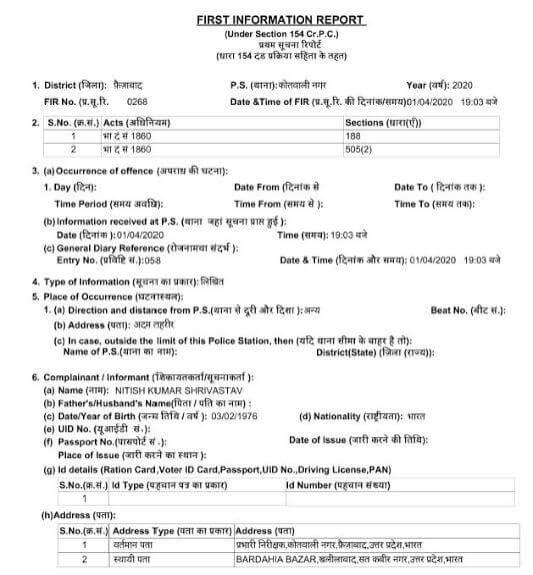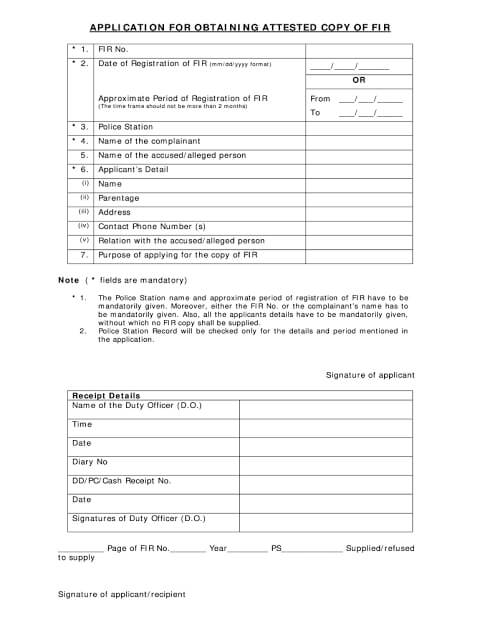Full Form of FIR
FIR Full Form
FIR stands for First Information Report. It is a written document or report prepared by the police based on any criminal or cognizable offense. This report is based on the information provided by the victim or any other person on behalf of the victim. A cognizable offense can be reported by anybody (who suffered from it) to the police in the written or oral form. Even in some extreme cases, a victim can also report an FIR through a telephone message.
When can an fir be lodged?
An FIR can be lodged in case of a cognizable offense only. The cognizable offense is the criminal activities that cause an immediate danger to society, such as rape, robbery, or murder. In case of a non-cognizable offense, only a non-recognizable report or NCR can be made. In such a case, an FIR can’t be lodged; even the police can’t arrest somebody without a warrant or court’s permission.
Who can register an fir?
The person who contains the knowledge of the Commission of a cognizable offense has the right to file the FIR. It is not mandatory that the FIR can be filed only by the victim. It can also be filed by the police officer who knows about the cognizable crime.
The cop had the right to file the FIR by themselves if:
- The police officer is the actual victim or the person who suffers from the offense.
- The police officer knows himself/herself about the commitment of an offense.
- The police officer is the witness of the offense.
Content present in fir
An FIR contains the following things:
- FIR file name
- Name of the victim, or name of the person who is filing the complaint on the victim's behalf
- Description of offense (facts of the incident)
- Date, time, and location of the crime
- Statements of witness (if any)

The offender’s name and description (if the person is known)
Sample of an FIR
Need of fir
FIR plays a very crucial role in the investigation of any criminal justice process. Because in most of the case, the cops can start the investigation only after registration of the FIR in the police station. The content of the FIR can not be altered after the registration, but if it is the decision of the Supreme Court or High Court to do so, then it can be done.
How to file an fir?
According to section 154 of the Act Code of Criminal Procedure, 1973, the procedure is given below should be followed while filing an FIR:

- The details are written down by the police provided by the victim orally about the commission of the cognizable offense.
- Then, the written form of the complaint must be read by the victim or the supplier of the information or makes a complaint. It is their duty and right to read the complaint recorded by the cop carefully to avoid any uncertainty in the future.
- The person signs the complaint or puts the left thumb impression on the document (if he/she is unable to read and write) after reading it and verifying that the details that are recorded by the police are as per the information given by him/her. The sign is required to make sure that all the information provided by him/her is relevant.
- In the end, the victim must ask for a copy of the FIR. This is also their right to have a copy of the FIR without any charges.
Sample of an Attested Copy of FIR
Things not to do while filing an fir
- Neither provide wrong information to the police nor file a false complaint. According to Section 203 of the Indian Penal Code, 1860, such activities are illegal or unlawful. In such cases, the police have the absolute right to prosecute under the law for misleading the police or providing the wrong information.
- Exaggerate or distort the facts should not be made.
- Vogue or unclear statements should not be given.
What is zero fir?
In some cases, it is found that the police refuse to lodge an FIR and harass the complainant. To tackle this problem, the SC introduced the Zero FIR. There is not any territorial boundary for a victim to register the FIR. He/she may go to any police station irrespective of such jurisdiction. Later the police station transfers the FIR to the relevant police station for further investigation of the case. In such a situation, the police officer can’t refuse to lodge an FIR by saying that the location of the offense doesn’t fall under their territorial jurisdiction.
What to do if fir is not registered?
- The complainant may go to the Superintendent of Police, Deputy Inspector General of Police or Inspector General of Police, or any other higher officer and send the complaint to them.
- The victim can also send his/her complaint to the Superintendent of Police in the written form or by post. If the superintendent feels the complaint at his/her expectation, then he/she investigate the case himself/herself or may order an investigation to be made.
- The victim can also file a private complaint in the court having jurisdiction.
- A victim has the absolute right to go to the State Human Rights Commission or the National Human Rights Commission in the case if the police are not investigating in an unbiased manner or not enforcing the law against the filed complaint.
However, according to Section 157, Criminal Procedure Code, 1973, in some cases, the police have the power not to investigate a complaint even after the registration of an FIR. But in these cases, the police have to provide the proper reason for not conducting the investigation and have to record the case in the letter also. The police have the exclusive right not to investigate in the situations mentioned below:
- When the case is illogical or not severe.
- When there are not enough proves and points for further investigation.
What is chri?

CHRI or the Commonwealth Human Rights Initiative is an international independent non-profit organization. The organization is working to encourage the practical realization of human rights in the Commonwealth. The headquarters of CHRI is located in India. CHRI also educates and spreads awareness for human rights issues and standards.
Logo of CHRI
At present, the organization is engaged in the following areas:
- Police Reforms
- Prison Reforms
- Human Rights Commissions
- Right to Information
- Human Rights Advocacy
- Constitutionalism